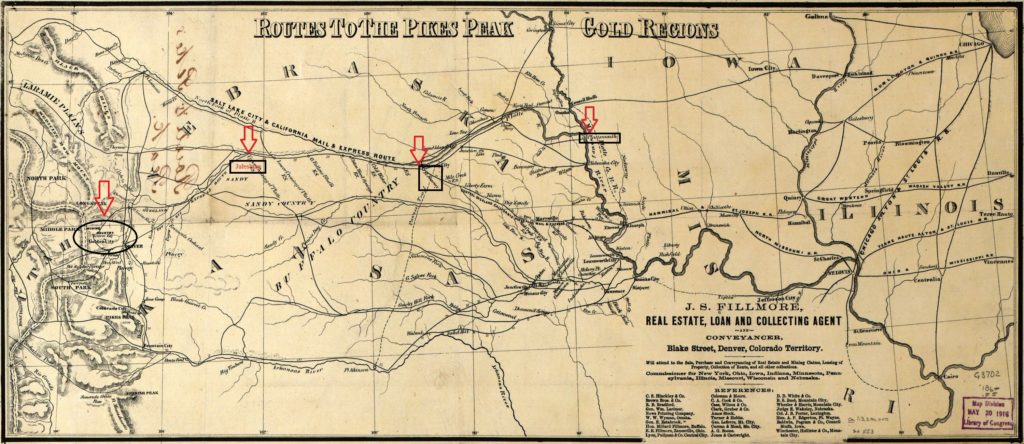A Pioneer Story: Pioneer Days. Part 7, Farming in Colorado

The house J.W. was building in the mining community of Spanish Bar was ready for occupancy come the Spring of 1861 and the family moved in. It was time to start mining, but since there were prospectors working sites next to those of J.W. he decided to wait a bit and see how they fared. He was likely glad he had waited since it turned out that the mines on Spanish Bar were only going to be rewarding to large companies that could work to the depth needed to get to the gold. As Laura put it: “men wandered off to other parts, – Georgetown or Central City, where mining had been carried on with success for a year or two.”
The Booth family stayed where they were for the summer and early fall, and then moved to Golden where they acquired a piece of land in the valley of Clear Creek, adjoining the town. They built a house and made ready to garden in the spring. (It seems as if it was a very good thing that J.W. could build houses – he built a number of them for the family! He was also able to construct tables, a bookcase, a cupboard, etc. with the left-over lumber. A neighbor was manufacturing chairs.)
So by the 17th of November they had moved in and were beginning to feel at home. And then, as Laura described it, on the morning of the 17th “there came a rushing, mighty wind sweeping down the canyon and carrying everything movable before it, threatening the destruction of our home and even of our lives.” Even though breakfast was in the works (bread in the oven and coffee steaming on the stove), Laura and the two children fled outside and were searching for a reasonable place to settle when J.W. rescued them by finding a place up canyon that would be sheltered enough. By nightfall the wind had not ceased and they were taken in for the night by a neighbor who had a more protected location. (I have looked for weather history to see if I could find any reports of this event, but found only one place online that mentioned it: http://gardnerhistory.com/sesquicentennialstories/golden/timeline.htm)
Golden was a big gardening center, producing food for the mining centers such as Center City, and the Booths set to farming the next spring. For a year that went well. The next summer, in July, suddenly they were besieged by grasshoppers, millions of grasshoppers in the sky. They lit on J.W.’s carefully planted cabbages and other vegetables and decimated them. The Booths were determined that the grasshoppers should not devour the fine field of tomatoes that were just in bloom. Their solution involved “getting a long rope and placing one of our two children at either end, who by running back and forth, kept the hoppers hopping so they had not time to gratify their appetites by eating our tomato vines. Thus becoming disheartened by our treatment of them they soon took leave without ceremony, greatly to the delight of the gardeners in the vicinity. The proceeds of the tomato patch rescued from the grasshoppers when marketed netted the snug little sum of $700.”
Two years of that sort of hardship and meager results led J.W. to think he would join a group going on West to check out mines lately discovered in Idaho, called the Bannock mines. He and Laura consulted and it was decided that she and the children would go back to Ohio for a year or two to visit the family there. Apparently there were so many people giving up and leaving the area that the Booths had to dispose of their household goods at a sacrifice since there was little market for such goods. J.W. was to stay in Golden for some time after the family left, wrapping up some business affairs before starting out for the mines in Idaho.

Leave a Reply